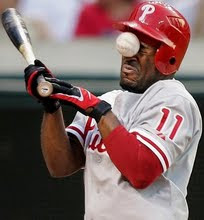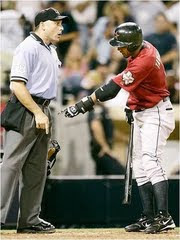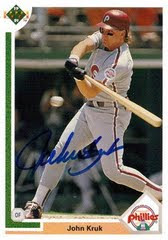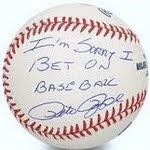Just so we are clear, let me delineate who plays each position (courtesy of Baseball-Reference)
2008 CUBS
C-Geovany Soto
1B-Derrek Lee
2B-Mark DeRosa
SS-Ryan Theriot
3B-Aramis Ramirez
LF-Alfonso Soriano
CF-Reed Johnson/Jim Edmonds (platoon)*
RF-Kosuke Fukudome
SP1-Carlos Zambrano
SP2-Ryan Dempster
SP3-12 starts by Rich Harden/10 starts by Sean Gallagher (platoon)
SP4-Ted Lilly
SP5-Jason Marquis
RP1-Carlos Marmol
RP2-Bob Howry
RP3-Michael Wuertz
RP4-Neil Cotts
RP5-Sean Marshall
CL-Kerry Wood
*-stats will be undervalued because values for offense are not split by team and Jim Edmonds had negative production on the Padres which will lower his cumulative value for the season.
2008 WHITE SOX
C-AJ Pierzynski
1B-Paul Konerko
2B-Alexei Ramirez
SS-Orlando Cabrera
3B-Joe Crede/Juan Uribe (platoon)
LF-Carlos Quentin
CF-Nick Swisher
RF-Jermaine Dye
SP1-Mark Buehrle
SP2-Javier Vazquez
SP3-John Danks
SP4-Gavin Floyd
SP5-Jose Contreras
RP1-Matt Thorton
RP2-Octavio Dotel
RP3-Scott Linebrink
RP4-Boone Logan
RP5-Clayton Richard
CL-Bobby Jenks
Before I present the data, it is important to note that I calculated differences in performance between the two teams based on the Cubs. This means that positive differences between BATTING DATA (as well as win values for batting and pitching) shows an advantage for the Cubs, while a negative difference shows an advantage for the White Sox. Likewise, for PITCHING DATA (FIP), a negative difference favors the Cubs and a positive difference favors the White Sox.
Here is the comparison data for hitters (click image to enlarge)

Here is the data for pitching (again, click the image to enlarge):

Finally, there is the cumulative Win data:

Superficially speaking, it might appear that the difference between the two teams last season was only .7 wins in favor of the Cubs. However, a deeper delve into the numbers will reveal the true nature of why Cubs starters will perform better than Sox starters in 2009 (and why the Cubs won 8 more games than the Sox last season):

What you can observe here is the following:
1) The Cubs have a CLEAR advantage in hitting over the White Sox. A look at wOBA data shows that the Cubs outperform the Sox Runs-Created relevant areas. Although the Sox may out home run the Cubs, the Cubs outwalk, out double and under-grind (less use of sac bunts, station-to-station smallball, etc) the White Sox.
2) Now that the The Cubs have subtracted Jim Edmonds and Mark DeRosa and added Milton Bradley and Mike Fontenot, the Cubs have GREATLY improved their defensive prowess. Last season, the Cubs were the 9th most efficient team at converting balls in play into outs. On the other hand, the White Sox, who were the 11th worst at converting balls in play into outs, have only decreased the ability of their defense by moving the defensively below-average Alexei Ramirez from 2B to SS and by subtracting Orlando Cabrera (the best defensive player in baseball last season), Crede and Nick Swisher and replacing them with Josh Fields and some combination of Dewayne Wise (below average) and Brian Anderson (slightly above average). This means that going forward, Cubs pitchers are more apt to (continue to) outperform their FIPs than the White Sox.
3) The Cubs pitching staff improved this season, while the White Sox's did not. Out are 300 IP of 4.5+ FIP baseball by Bob Howry, Michael Wuertz and Jason Marquis. Sadly, out too is Kerry Wood. However, in comes pieces like Kevin Gregg (above average), Aaron Heilman (above average) and Angel Guzman (average). Furthermore, "poor" innings of baseball thrown by Gallagher and Jason Marquis last season will be replaced by average/excellent innings by Sean Marshall/Rich Harden (if healthy). The Cubs have plenty of average/above average SP depths (ie, Jeff Samardzija) around to deal with health concerns in the starting rotation (average innings+excellent innings=better than average innings). The White Sox, as I just mentioned, added no value-added pieces (Bartolo Colon? Bahahahah) and a lot of the pieces they have in place (Dotel, Floyd and even Danks to some extent) are headed towards some serious regression in 2009.
Thus, my conclusions are the following:
1) In terms of all around production, the Cubs were a better team than the White Sox in 2008, but thanks to much luck on behalf of both teams, the performance gap between the two teams last season was actually smaller than you might expect.
2) The Cubs had a SIGNIFICANTLY superior (almost ten fold) offense than the White Sox in 2008. There is really no reason to expect a notable decrease in the offense gap between the two teams in 2009 (you can add a month of Carlos Quentin, but you need to reconcile it against some possible regression in his production) because the Sox didn't really add any offensive pieces (also, the Cubs added Milton Bradley).
3) The White Sox defense was one of the worst in baseball last season and is only getting worse. The Cubs defense was top 10 in 2009 and thanks to the subtraction of Edmonds (1.5 defensive WINS below average) and DeRosa (average defensively)/additions of Mike Fontenot (+6.5 runs above average defensively in under 1000 career innings (less than a full season of work)) and Milton Bradley (+2.9 fielding runs above average). This will give the Cub's pitching staff and advantage over the White Sox pitching staff. In terms of FIP, however, both teams were roughly equal all around last season.
4) Ozzie Guillen is a terrible manager. I don't care if the White Sox did win a World Series in 2005. I don't care if he's a "fiery" son-of-a-bitch who motivates his team with untraditional, often homophobic/misogynistic antics. The mere fact that Ozzie Guillen plays station-to-station baseball (small ball), is committed to bunt, ignores the necessity of his players to get on-base regularly and liberally issues free passes in the form of "retaliation" is just going to bite him in the ass as it did in 2007. Once Ozzie stops winning, those comments he makes and actions he takes will be the icing on the cake that is him getting fired. It's also good to note, as irrelevant as it may be, that Ozzie was also (one of) the worst baseball players in the long and colorful history of baseball.
5) Flyball pitchers and The Cell are a bad combination. Gavin Floyd gave up the fifth most home runs (30 bombs in 2008) among any started in baseball last season. John Danks is a flyball pitcher (1.41 HR/9 in the minors) who cut down on his long ball big time last season thanks to a 10% increase in GB% at the expense of his FB%. While Danks is young and could easily sustain an improved HR/9 rate, logic suggests his .69 HR/9 rate last season is most likely to approve/exceed 1.00. Floyd, by the way, was the only sub-4 ERA pitcher with 29 or more home runs, thanks to an incredibly high volume of solo shots. You have to expect some serious regression there.
6) Groundball pitchers and the White Sox defense are a bad combination. Mark Buerhle is a pitch-to-contact hurler with a below average fielder at every position in the infield this season. Orlando Cabrera's +1.5 fielding wins, the best in baseball last season, and Joe Crede's +6.4 fielding runs are no longer there to bail out/balance the defensively challenged Alexei Ramirez (Steve Phillips would tell you his eyes tell him Ramirez is a solid or plus defender) and Paul Konerko. Groundball pitchers+below average defense=frowny face :(







4 comments:
i just got home from lab. i tried reading the post but my brain isnt working right now.
This is a stupid fucking post because it's CLEARLY OBVIOUS the 2008 Cubs were better than the Sox and will be this year. You don't have to use sabermetrics to prove your point. There are some people (the friend you had the initial argument with) will never understand true logic and stats. I agree the "eye test" is normally bad, but here it works just fine. Yes, you obviously CAN delve deeper and use stats to prove your point but you just wasted at least an hour of your life writing this post. Dude seriously, I know for a fact you have class and homework you care about. Call your girlfriend or something. I agree with the logic and argument and conclusion and all that, but seriously, this post really is a waste of time
Also, after actually reading your posts, I object your your comments on Ozzie Guillen.
1) You clearly have this bias against him as a player so you take it out on him as a manager. Asshole.
2) You'd be surprised how little he actually plays small ball. He played it a lot on 2005 when his player were crappier (i.e. Scotty Pods, Darin Erstad) but overall this perception of "Ozzieball" = "small ball" doesn't actually exist. Ozzie's team in full of guys who have HR power and walk and Ozzie takes full advantage of them. And the "retaliation" approach Ozzie has- yeah doesn't happen all that often and is negligible
2a) Last year vs the Cubs in one game, Ozzie had a player on base (I think one time there was a lead off double) and Ozzie was criticized for NOT bunting. The game was close and yes he would have wasted outs but it was so late in the game that those outs should have been sacrificed for a run. Further proof that Ozzie "likes to play small ball" doesn't really exist.
3) In years when the ChiSox suck, Ozzie's comments drop off. In baseball, no matter what, if you win, you can say what you'd like. Even though everything Ozzie has ever said had essentially been true, he's smart enough to shut his mouth when his team loses. Plus him and Kenny Williams are butt buddies and Williams determines who the manager is. As long as Williams is the GM, Ozzie is the manager
4) I have only two real critiques if Ozzie, who he bats at the top of the order and certain free agents to target. This years top of the order is DeWayne Wise and Chris Getz, two guys who are shit to begin with and don't walk. Last year, he had Orlando Cabrera (a .260 for vast majority of the year) and AJ. Again, both guys who don't walk. But then again, who else is he gonna put at the top? He doesn't have pure OBS guys, really ever. Also, he targeted guys like Erstad. But really, what else was he supposed to do, play Brain Anderson, another guy who doesn't walk? Other than that, the two jobs a manger does, determining batting order and when to replace pitchers, he does a fine job. So he's made some seemingly bad decisions, but when you dig deeper you realize he didn't have all that much of a choice
5) A big problem with the Sox is that they have an organization that uses a line up of below average defenders and HR guys. Kenny seemingly has a knack for finding pitchers, but this problem is with the offense/ their defense. This is not Ozzie's fault.
6) Ozzie really is the face of the organization and he's purely entertaining. The managerial role is pointless in baseball, so why not have a guy who is entertaining and fun
Also a mis-wrote.
I wrote Darin Erstad was on the 2005 team, he obviously was not
In 2a, I meant to write the ChiSox had a player on base in the beginning of the 7th, 8th and 9th inning with either no outs or one out and clearly in situations were bunting would have helped win the game.
Post a Comment